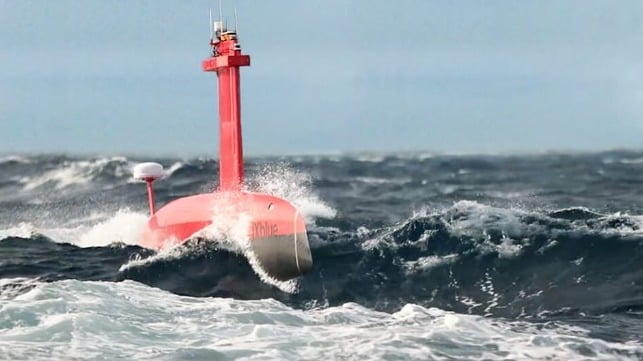Innovative Unmanned Surface Vessel Receives BV’s First AiP for a UAV

In what could mark a significant step forward for the development of unmanned autonomous vessels, the French classification society Bureau Veritas awarded its first Approval in Principle (AiP) for an unmanned surface vessel. The approval was awarded to a French company iXblue for its vessel named DriX, an eight-meter Unmanned Surface Vehicle (USV) designed to assist with hydrographic and geophysical surveys, water column analysis, as well as subsea positioning operations. According to BV, the AiP addresses the safety requirements of the marine drone, which operates under the novel concept of remotely supervised autonomy.
This first certification of an Unmanned Surface Vessel (USV) BV said it believes will help strengthen global acceptance of this technology by supporting operators in their risk analysis and mission planning for USVs deployment. The USV sector is expanding rapidly, and the acceptance of these novel marine drones depend on the capacity to demonstrate that they are safe to deploy and operate. BV and iXblue have been working in close collaboration to raise the standards and acceptance of USVs.
Stéphane Vannuffelen, Marine Autonomy Technical Director at iXblue, said: “We are convinced that the acceptance of autonomous solutions in the marine ecosystem requires a collaborative approach between manufacturers, class societies and authorities, and this work done with BV goes in that direction. This certification is a major achievement not only for DriX, but for the whole maritime industry, supporting its 4.0 transition.”
DriX has been used by major hydrographic institutes and energy companies worldwide. It is equipped with advanced perception means, including radar, lidar, and cameras, as well as artificial intelligence, which enables it to adapt to its environment, avoid obstacles and carry out missions autonomously.
“Smart vessel operations can enable the maritime industry to increase productivity, predictability, and efficiency while reducing operational risk on the water,” said Laurent Leblanc, Senior Vice President of Technical & Operations at Bureau Veritas Marine & Offshore. “At BV, we are committed to supporting innovation with our robust set of standards to enable these new technologies to reach the market and ensure that they are safely implemented.”

that matters most
Get the latest maritime news delivered to your inbox daily.
DriX has been certified by BV for its system architecture, its operational envelope, its construction (Malta Cross certificate for the hull), as well as its autonomy functions. During the AiP process, Bureau Veritas Solutions Marine & Offshore conducted a Hazard Identification (HAZID) study. This HAZID study identified and assessed the hazards of Maritime Autonomous Surface Ships (MASS) when unmanned, taking into account the level of automation, direct and remote control, autonomy, area of operation, and vessel type and design. BV Solutions M&O also conducted a Failure Mode Effects and Criticality Analysis (FMECA) on critical components previously identified during the HAZID study to identify, evaluate and mitigate the effects of essential equipment failure and to improve the reliability of automation systems associated with essential services.
Since its launch in 2017, DriX has been operated on numerous assignments, including being selected by the U.S. National Oceanic and Atmospheric Administration (NOAA) to create the next generation ocean exploration system. In France, DriX has been tested by the French Navy's Hydrographic and Oceanographic Service (SHOM).
